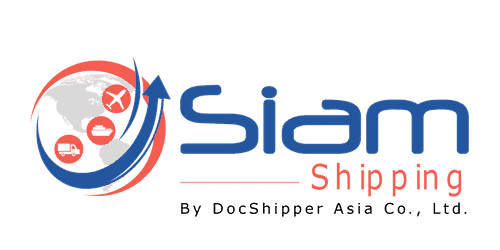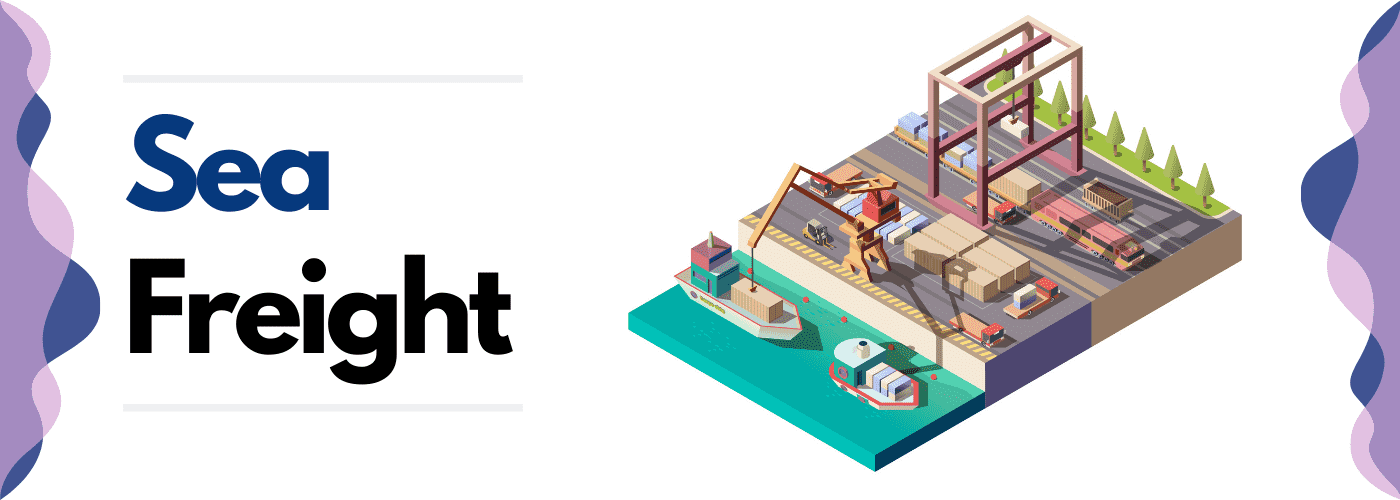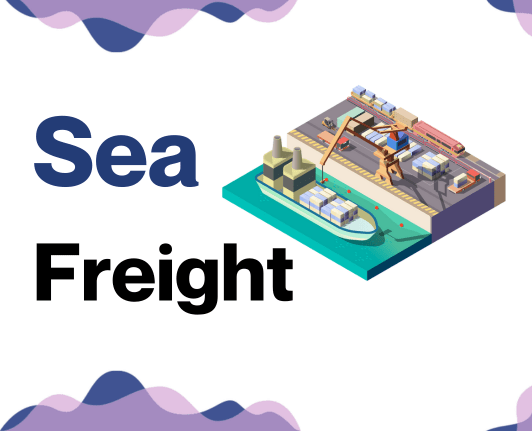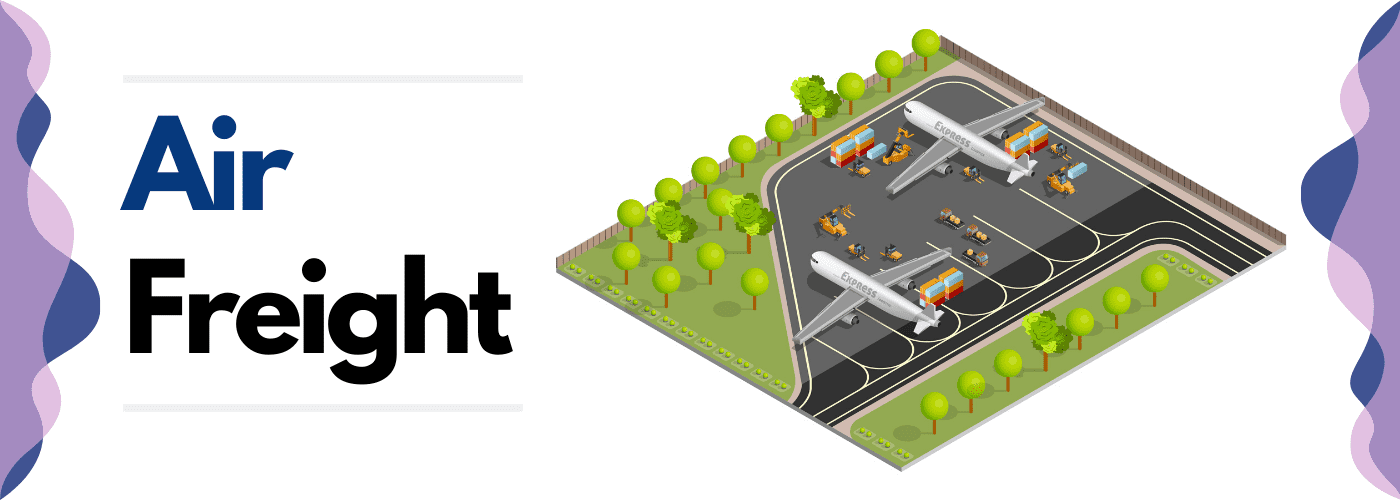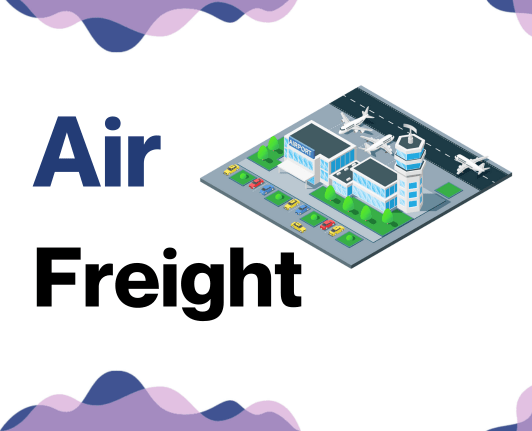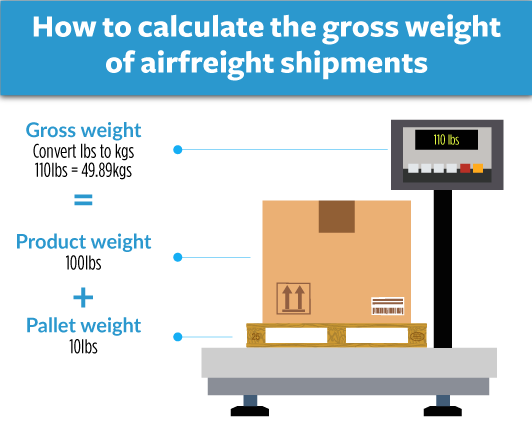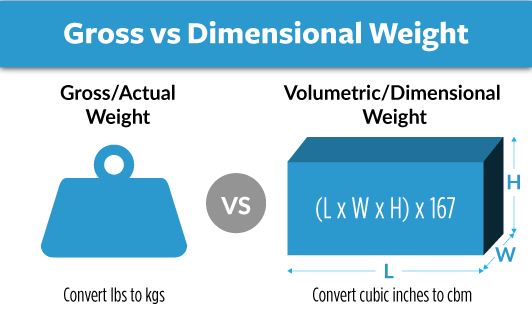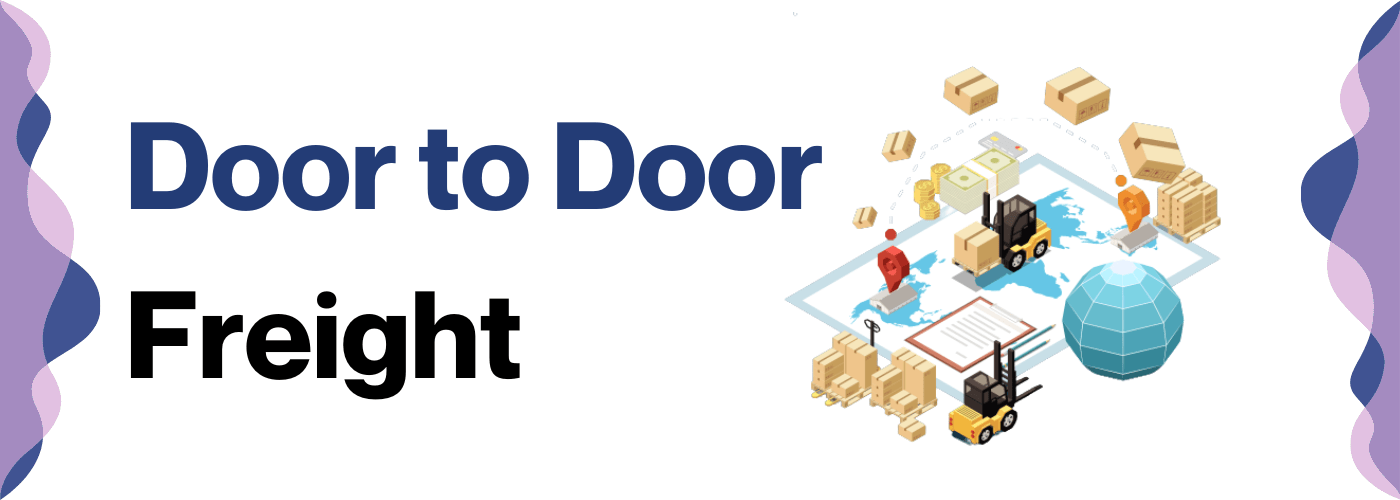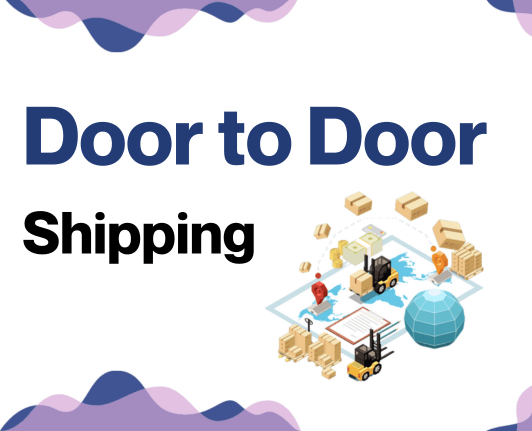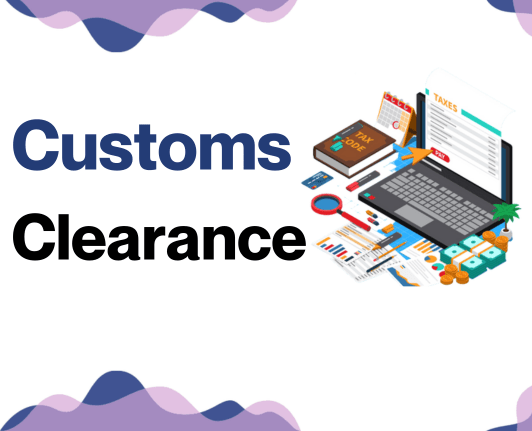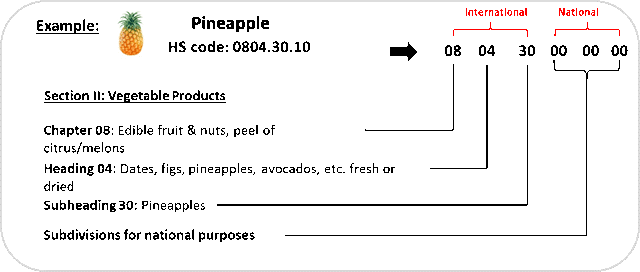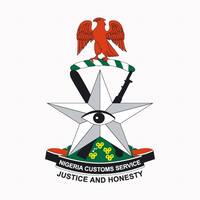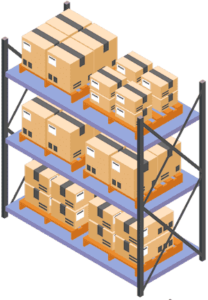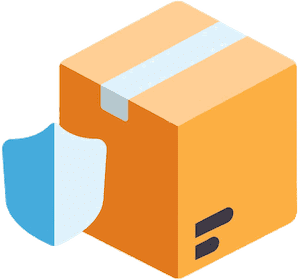Ever tried to tell an elephant not to stomp too hard? Well, that's simpler than navigating the labyrinthine world of freight transport between Thailand and Nigeria! Rates, transit times, customs regulations - everything can seem overly complex if you're not armed with the right knowledge. Fear no more! This guide has got you covered. It'll illuminate the maze of transportation options - air, sea, road, and rail - and guide you through the thick fog of customs clearance, duties, and taxes.
We're here to offer customized advice for businesses, answering every question of yours around Thai-Nigerian logistics. If the process still feels overwhelming, let DocShipper handle it for you! We make the difficult easy; partnering with us turns shipping challenges into triumphant success stories. We're your one-stop-shop for all things freight-related, taking you on a journey that's smoother than Thai silk and stronger than Nigerian steel.
Table of Contents
Which are the different modes of transportation between Thailand and Nigeria?
Choosing the best way to transport goods from Thailand to Nigeria is like organizing a complex journey. If you picture this on a globe, you'll spot the challenge – these countries are on different continents, separated by lengthy sea and land routes. Wading through bustling city traffic might seem simpler! Even Santa would scratch his head deciding whether his sleigh is faster by air or sea. Let's take this step-by-step, reviewing ocean, air, and road options to find your perfect match, just like assembling a jigsaw puzzle. Because making the right choice in transportation will help your business thrive in these specific locations.
How can Siam Shipping help?
Shipping goods from Thailand to Nigeria and puzzled by the complex logistics involved? Let DocShipper's experienced consultants handle all the hard work for you. From custom clearance to door-to-door delivery, we've got you covered. Intrigued? Grab a free estimate in less than 24 hours. Have questions? You're only a call away from free expert advice.
Siam Shipping Tip: Consider ocean freight if:
- You are shipping large volumes or bulky items, as sea freight offers the most space at a cost-effective rate.
- You're not racing against the clock. Ocean freight takes its sweet time, especially when stacked up against other transport methods.
- Your supply chain is linked up with big-name ports. Think of it as the VIP lane on the maritime superhighway.
Sea freight between Thailand and Nigeria
The business channel linking Thailand and Nigeria through ocean shipping is a thriving trade artery, pumping goods between bustling ports like Laem Chabang and Lagos. While this seafaring route offers a cost-effective way to transport high-volume shipments, it bobs along the slow current of sea freight's time-consuming nature.
Yet, the real anchor that weighs down many shippers is navigating the choppy sea of customs requirements, paperwork, and logistics associated with sending goods from Bangkok's industrial heart to Nigeria's thriving marketplaces. The task often feels like untangling a knotted fishing line - frustrating and time-consuming. However, there is a way to smooth these waters. This section will cast a wide net on expert-recommended strategies and important specifications necessary for a seamless shipping journey. The gains? Greater efficiency and a streamlined process that saves your business precious time and money.
Main shipping ports in Thailand
Laem Chabang Port
Location and Volume: Laem Chabang Port is strategically located in the Chonburi Province, around 125 kilometers south-east of Bangkok. This port stands as Thailand's largest, with a shipping volume surpassing 18 million TEUs annually.
Key Trading Partners and Strategic Importance: Laem Chabang's major trading partners include China, the United States, Japan, and Indonesia. As Thailand's crucial maritime center, it's key to the country's economic stability and plays a vital role in fostering international trade.
Context for Businesses: Businesses striving to access both local and international markets should consider Laem Chabang Port. Its state-of-the-art facilities, extensive shipping volume, and accessibility to Thailand's key industrial zones substantially enhance global trade opportunities.
Port of Bangkok
Location and Volume: The Port of Bangkok, located on the west bank of the Chao Phraya River in Khlong Toei District, is a central hub for the nation's imports and exports, handling over 8.7 million TEUs per year.
Key Trading Partners and Strategic Importance: Key trading partners include China, Japan, the US, and Malaysia. The Port's advantageous position in Thailand's capital city and its access to the larger Asian market give it a significant strategic importance.
Context for Businesses: If you aim to directly reach the busy markets of Thailand's capital, the Port of Bangkok could be a critical part of your logistics strategy given its proximity to the city and extensive inland connectivity.
Sattahip Commercial Port
Location and Volume: Located south of Pattaya City, in the Chonburi Province, Sattahip Commercial Port plays a valuable role in Thailand's trade sector, handling 1.1 million TEUs annually.
Key Trading Partners and Strategic Importance: Its main trading partners include countries in the Southeast Asia region, like Malaysia and Indonesia. The port's strategic value comes from its proximity to the Eastern Seaboard industrial region, making it ideal for cargo transportation.
Context for Businesses: For businesses trading with Southeast Asian countries and seeking efficient regional supply chain management, Sattahip Commercial Port is highly relevant due to its close proximity to the Eastern Seaboard, Thailand's key industrial and manufacturing hub.
Songkhla Port
Location and Volume: Songkhla Port is located at the southern tip of Thailand on the east side of the Mala y Peninsula. It handles a smaller volume compared to the other ports but nevertheless plays an essential role in connecting the southern region of Thailand to the rest of the world.
Key Trading Partners and Strategic Importance: Its key trading partner predominantly includes Malaysia, given the port's close geographical proximity. Its strategic significance highlights the gateway it provides to the Gulf of Thailand and the rest of Southeast Asia.
Context for Businesses: With Songkla Port at your disposal, businesses targeting the southern Thai markets or the broader Southeast Asian region can consider this port as part of their primary shipping strategy due to its geographical position and seamless access to the Gulf of Thailand.
Map Ta Phut Port
Location and Volume: Map Ta Phut Port, located in the Rayong Province, is the world's eighth-largest port in terms of cargo handling, particularly petrochemical products, and handles nearly 16 million tonnes of cargo annually.
Key Trading Partners and Strategic Importance: Major trading partners of this port are Japan, China, and the ASEAN countries. The Port of Map Ta Phut holds immense strategic importance because of its heavy industrial setting and its capacity to handle specialized goods.
Context for Businesses: Businesses dealing with specialty cargo, particularly petrochemical products, would find Map Ta Phut Port essential for their logistics due to its specialised facilities and equipment designed to handle such cargo safely and efficiently.
Sriracha Harbour Deep Seaport
Location and Volume: Sriracha Harbour Deep Seaport, primarily a private port in Chonburi Province, is relatively smaller in volume but serves a pivotal role for companies located in the Eastern Seaboard region.
Key Trading Partners and Strategic Importance: The port chiefly caters to the businesses located nearby, within the region. Its smaller setup and private nature allow for a more personalized shipping experience.
Context for Businesses: If your operation is based in the Eastern Seaboard area or looking for a private shipping experience, Sriracha Harbour Deep Seaport offers a streamlined, tailor-made experience that can accommodate your needs effectively. Such a setup can conveniently ease the administrative burden and the shipment delivery times.
Main shipping ports in Nigeria
Apapa Port
Location and Volume: Nestled within the bustling city of Lagos, Apapa Port is the largest port in Nigeria and a major gateway to the Nigerian economy, boasting a shipping volume of over 600,000 TEU annually.
Key Trading Partners and Strategic Importance: The port's key trading partners range from China, the United States to The Netherlands. Being the largest port, it holds significant strategic importance, contributing considerably to the Nigerian economy.
Context for Businesses: If you're considering expansion into West Africa, the Apapa Port may be an ideal choice. With its extensive capacity and proximity to commercial hub Lagos, it could provide necessary infrastructure for your logistics strategy.
Tin Can Island Port
Location and Volume: Located immediately to the west of Apapa Port in Lagos, Tin Can Island Port is Nigeria's second largest port and handles around 30% of the country's imports, translating to a shipping volume of nearly 300,000 TEU annually.
Key Trading Partners and Strategic Importance: Its major trade partners span across Europe, Asia, and America. Its strategic position nearby Nigeria's economic center amplifies its importance.
Context for Businesses: Tin Can Island Port is renowned for its capability to handle a wide array of cargo. If your business deals with diverse types of goods, this port may offer the versatility needed for your shipping requirements.
Onne Port
Location and Volume: Near the oil-rich city of Port-Harcourt, Onne Port is central to Nigeria's oil industry. It handles a considerable volume of oil & gas-related equipment and supplies.
Key Trading Partners and Strategic Importance: It primarily deals with countries involved in the Oil & Gas industry. Its strategic importance is undeniable due to its role in Nigeria's chief export industry.
Context for Businesses: If your business operations are connected to the Oil & Gas industry, the Onne Port would likely be a crucial component in your logistics and shipping strategy.
Rivers Port
Location and Volume: Situated in Port-Harcourt capital of River State, Rivers Port is a vital port involved in both import and export activities.
Key Trading Partners and Strategic Importance: Most of its trade is with countries in Western Europe, North and South America, and Asia. Its location in oil-rich Rivers State underlines its strategic significance.
Context for Businesses: For businesses involved in the energy industry or looking to tap into the oil-rich markets of West Africa, Rivers Port might serve as a pivotal gateway to these markets.
Calabar Port
Location and Volume: Based in the semi-urban city of Calabar in Cross River State, Calabar Port is key to supply chain processes in Southeastern Nigeria.
Key Trading Partners and Strategic Importance: Key trading partners include China, India, and Brazil. Its geographical position allows seamless transportation to countries on the Atlantic coast.
Context for Businesses: If your business operations are geared towards agriculture or manufacturing, Calabar port, with its proximity to agricultural and manufacturing hubs, may feasibly serve your logistics needs.
Warri Port
Location and Volume: Found in the oil-rich Delta region, Warri Port is a key shipping harbor used mostly for the exportation of petroleum products.
Key Trading Partners and Strategic Importance: Being pivotal to Nigeria's oil exports, key partners are those in the petroleum industry. It is strategically important as it bolsters Nigeria's lucrative petroleum dealings.
Context for Businesses: If your business is engaged in the international petroleum market, adding Warri Port to your shipping strategy may facilitate smoother and faster transactions.
Should I choose FCL or LCL when shipping between Thailand and Nigeria?
Choosing whether to ship by consolidation Less than Container Load (LCL) or a full container (FCL) from Thailand to Nigeria is more than just a tossup. Your business's success relies on this choice as it directly influences cost, delivery time, and smoothness of your shipping process. Being informed about these sea freight options is vital to making a decision that best suits your specific needs. Ready to dive deeper? Let's unpack this together and help you streamline your shipping experience.
LCL: Less than Container Load
Definition: LCL shipment, which stands for Less than Container Load, refers to shipments that do not fill a standard 20 or 40-foot container. It's essentially shared shipping, where you pay for a portion of the container based on the volume of your cargo.
When to Use: Consider LCL freight if your cargo is less than 15 Cubic Meters (CBM). Being flexible and cost-efficient for smaller volumes, it eliminates the need to wait until you have enough goods to fill a whole container.
Example: For instance, you own a small business in Thailand that sells handicrafts. A retailer in Nigeria places an order that amounts to around 12 CBM. Rather than renting an entire container and wasting space, you opt for an LCL shipping quote, ensuring your goods ship faster and at a reasonable price.
Cost Implications: While LCL is more cost-effective for smaller shipments, there are additional costs to consider. These include the shipment fee based on volume, consolidation fee, deconsolidation fee, and local fees at both the origin and destination ports. These additional charges can add up but will generally still be lower than renting a full container if your cargo is under the 15 CBM threshold.
FCL: Full Container Load
Definition: FCL shipping, or Full Container Load shipping, involves booking an entire FCL container for your cargo alone. It gives you control over your shipment from origin to destination, as the container remains sealed during transit.
When to Use: This method is advisable for high-volume shipments, typically more than 13, 14, or 15 CBM. It offers cost benefits for bulk shipping and greater security as other shipments don't share your container space.
Example: Consider a toy manufacturer that needs to ship 1000 carton boxes of toys, each measuring 0.01 CBM from Thailand to Nigeria. Opting for a 20'ft or 40'ft FCL container would be cost-effective and safer, given that the entire container would be filled with their products only.
Cost Implications: While the initial cost for an FCL shipping quote might seem high compared to LCL or Less Container Load option, it's important to note that cost per unit decreases significantly when you're shipping high volumes. For instance, the rate for a 20'ft container might be higher overall, but significantly lower when calculated per unit compared to smaller, shared LCL shipments. Furthermore, using FCL can avoid additional handling charges incurred in shared containers, making it a cost-effective choice for larger shipments.
Unlock hassle-free shipping
Ocean freight confusing you? DocShipper, your freight forwarder ally, simplifies shipping decisions. Our expertise helps you choose between consolidation and full-container shipping methods, factoring in quantity, budget, and urgency. Don't be tangled in logistics; let our team steer the route to Nigeria from Thailand. Await an effortless cargo journey, tailored for your business. Ready for a seamless shipping experience? Contact us for a free estimation now!
How long does sea freight take between Thailand and Nigeria?
Sea freight between Thailand and Nigeria typically takes around 30-40 days. However, it's important to note that these transit times can vary. They depend on factors such as the specific ports used, the weight of the shipment, and the nature of the goods you're transporting. For a more precise and tailored quote, we recommend you get in touch with a freight forwarder like DocShipper.
How much does it cost to ship a container between Thailand and Nigeria?
Determining the exact cost to ship a container between Thailand and Nigeria isn't as straightforward as a set price tag. Ocean freight rates per Cubic Meter (CBM) can significantly vary, oscillating due to the varied Point of Loading, Point of Destination, carrier options, the nature of the goods you're shipping, and month-to-month market fluctuations. However, don't let this discourage you. Our experienced shipping specialists are dedicated to providing the best, and most competitive shipping cost, each case meticulously quoted to ensure you receive the optimal service tailored for your specific needs. Rest assured, we're here to simplify this journey for you.
Special transportation services
Out of Gauge (OOG) Container
Definition: An OOG container is designed to carry cargo that exceeds the standard dimensions of regular shipping containers. It's perfect for Out of gauge cargo which is too large or not proportionate to fit into a standard container.
Suitable for: Heavy machinery, industrial equipment, loaded pallets that have larger dimensions.
Examples: Building materials, large factory machinery or oversized vehicles.
Why it might be the best choice for you: OOG container could be your optimal choice if you're dealing with exceptionally large cargo or items that cannot be disassembled into smaller pieces.
Break Bulk
Definition: Break bulk cargo is loaded individually onto the ship rather than in containers. It involves the handling of every single package or unit while loading/unloading the vessel.
Suitable for: Smaller shipments which wouldn't efficiently fill a container, or goods that aren't suited to container shipping.
Examples: Bags of coffee, boxes of shoes, drums of liquid, or even individual machine parts.
Why it might be the best choice for you: Break bulk might be your go-to option if you have a slightly smaller load of goods that varies in shape and size, not making it practical to fit into regular containers.
Dry Bulk
Definition: Dry bulk shipping involves the transportation of homogeneous commodities in large quantities in an unpacked form.
Suitable for: Solid raw materials with very high mass with properties that allow them to be stored in a pile, like metal ores, coal or grains.
Examples: Minerals, coal, iron ore, grains or sugar.
Why it might be the best choice for you: Choosing dry bulk as your shipping method can be cost-efficient if your business deals with significant quantities of homogeneous loose cargo loads.
Roll-on/Roll-off (Ro-Ro)
Definition: Ro-ro vessels are designed to carry wheeled cargo, where items are rolled on and off the vessel on their own wheels or using a platform vehicle.
Suitable for: Vehicles such as cars, trucks, semi-trailer trucks, trailers, as well as heavy machinery or any other items which can be rolled.
Examples: Construction machinery, tractors, buses, trucks or cars.
Why it might be the best choice for you: Roll-on/Roll-off may be suitable for you if your business deals with vehicles or heavy machinery since loading and unloading become simpler and more efficient compared to other transportation methods.
Reefer Containers
Definition: Reefer containers are temperature-controlled containers used for the transport of perishable goods across long distances.
Suitable for: Perishable products requiring consistent temperature control such as fruits, vegetables, dairy products, or pharmaceuticals.
Examples: Produce from the agricultural sector, meat, fish, dairy products or even medical supplies.
Why it might be the best choice for you: If your business depends on the transportation of perishable goods that require specific temperature conditions, then opting for reefer containers would be an optimum choice to retain your goods' quality and freshness.
At DocShipper, we're here to help navigate these options and tailor solutions to your specific needs. If you're ready to talk more about your shipping requirements between Thailand to Nigeria, do not hesitate to contact us. We'll provide you with a free shipping quote in less than 24 hours.
Siam Shipping Tip: Consider Air freight if:
- Time's ticking and you can't wait. Air freight is like the express train of shipping; it's the quickest way to get your stuff from A to B.
- You're not shipping a warehouse. If your cargo is under 2 CBM, air freight is a snug fit for your smaller haul.
- Your supply chain ends somewhere off the beaten path. Airports are everywhere, so you can get your goods to those hard-to-reach spots.
Air freight between Thailand and Nigeria
Speed, reliability, and cost-effectiveness make air freight between Thailand and Nigeria the go-to choice for shipping small, high-value items. Imagine sending delicate electronics or cutting-edge pharmaceuticals — these goods thrive in the swift and secure environment that air freight provides.
However, beneath the surface of shipping decisions, costly mistakes are just waiting to be made, like a ticking time bomb in a treasure chest. It’s easy to misjudge the price by not using the accurate weight formula, which can lead to overspending, as if you're handing out extra cash with every shipment. This guide helps expose these hidden pitfalls to ensure your air freight experience is smooth sailing, keeping your wallet happy, and your business buoyant. Let's dive in and unravel best practices to make your air freight journey stress-free and cost-effective!
Air Cargo vs Express Air Freight: How should I ship?
Struggling to choose between air cargo and express air freight for your shipments from Thailand to Nigeria? Think of it this way: air cargo plays Tetris in an airline's cargo space, while express air freight commandeers its own dedicated plane for that super-speedy delivery. Let's explore these two options and find out which suits your business requirements better.
Should I choose Air Cargo between Thailand and Nigeria?
Choosing air cargo can be a valuable decision when shipping goods between Thailand and Nigeria. Airlines like Emirates and Ethiopian Airlines are prominent in this field. They offer frequent, reliable services that can accommodate a wide variety of commodities. Balanced against this is longer transit times due to fixed schedules. However, from 100/150 kg (220/330 lbs) of cargo, air transport can be more cost-effective, adding an extra layer of appeal for your budgetary needs. Research these options thoroughly - the choice of carrier and the cost-efficiency of air freight could significantly streamline your supply chain.
Should I choose Express Air Freight between Thailand and Nigeria?
When shipping small cargo volumes, say less than 1 CBM or 100/150 kg (220/330 lbs), opting for express air freight becomes an astute choice. It's a speedy service provided by dedicated cargo airlines, devoid of passengers, ensuring swift delivery. International courier giants FedEx, UPS, and DHL excel in this realm. For your Thailand-to-Nigeria route, it's especially beneficial if you're prioritising speed over cost. Paired with their comprehensive tracking systems, your shipments are not only fast-tracked but also continually monitored, offering you peace of mind while shipping. Choose wisely, as it can be the turning point in maintaining a competitive edge in your market.
Main international airports in Thailand
Suvarnabhumi Airport
Cargo Volume: Suvarnabhumi Airport deals with 97,700 tons of cargo annually, making it one of the primary airfreight hubs in Southeast Asia.
Key Trading Partners: Its key trading partners include China, Japan, USA, Australia, and India.
Strategic Importance: Strategically located in Bangkok, it serves as a global gateway to Asia and the Pacific.
Notable Features: Known for its advanced cargo handling facilities, Suvarnabhumi Airport also has a dedicated Free Zone for transshipment cargo.
For Your Business: With excellent global connections and cutting-edge facilities, Suvarnabhumi Airport could work as the primary hub for your shipments to Asia and the Pacific. That said, check its official website here(not available) for more information.
Don Mueang International Airport
Cargo Volume: Don Mueang handles approximately 35,000 tons of freight per year.
Key Trading Partners: The primary trade partners are China, Japan, and ASEAN countries.
Strategic Importance: Known as the secondary international hub in Bangkok, Don Mueang is integral to domestic freight routes.
Notable Features: This airport provides excellent warehousing facilities and cold chain logistics services.
For Your Business: Especially if your company deals with perishable items or seeks to ship domestically within Thailand, Don Mueang offers the infrastructure you need. More details can be found here(not available).
Phuket International Airport
Cargo Volume: Phuket International Airport processes over 25,000 tons of cargo annually.
Key Trading Partners: It primarily trades with China, Australia, UK, Russia, and Singapore.
Strategic Importance: Located in Phuket, one of the busiest tourist destinations in Thailand, it plays a crucial role in local economy.
Notable Features: It's known for facilitating the seamless movement of freight for the booming tourism industry.
For Your Business: If your business is connected to the tourism sector, Phuket International Airport would be an ideal choice for transporting goods. Check out its official website here(not available).
Chiang Mai International Airport
Cargo Volume: Handling around 18,000 tons of cargo per year, it's the chief airfreight hub in Northern Thailand.
Key Trading Partners: The main trading partners include China, Hong Kong, and Japan.
Strategic Importance: Chiang Mai International Airport's location allows it to serve the large northern region of Thailand.
Notable Features: It's known for managing expedited cargo handling process with highly efficient infrastructure.
For Your Business: If your company is focused on reaching areas in Northern Thailand or parts of China, this airport should be on your radar. Information can be found here(not available).
U-Tapao Rayong Pattaya International Airport
Cargo Volume: U-Tapao Rayong Pattaya is an emerging player in the industry, currently handling substantial volumes of cargo.
Key Trading Partners: Its primary trading partners are China and ASEAN countries.
Strategic Importance: Situated in the Eastern Economic Corridor, it holds great promise for future freight transition.
Notable Features: The airport is in the process of constructing an Aviation and Logistics Hub.
For Your Business: Businesses interested in tapping into the potential of the Eastern Economic Corridor should look to U-Tapao Rayong Pattaya. More details can be found here(not available).
Main international airports in Nigeria
Murtala Muhammed International Airport
Cargo Volume: As Nigeria's busiest airport, Murtala Muhammed processes over 65% of the country's cargo, an estimated 170,000 metric tonnes each year.
Key Trading Partners: China, India, the U.S., and South Africa top the list.
Strategic Importance: Situated in Lagos, Nigeria's economic hub, it plays a central role in the importation of consumer goods, electronics, and spare parts to feed the nation's large population.
Notable Features: Renowned for its modern cargo facilities, the airport includes bonded warehouses, a Free Trade Zone, and dedicated cargo handlers.
For Your Business: If your primary target market is within Lagos and its environs, Murtala Muhammed International Airport would provide the most efficient access to that region.
Nnamdi Azikiwe International Airport
Cargo Volume: With an annual cargo volume of over 51,000 metric tonnes, this is Nigeria's second busiest airport.
Key Trading Partners: Its major trading partners are the U.S., India, United Kingdom, and the Netherlands.
Strategic Importance: As the airport serving the nation’s capital, it is synonymous with political, diplomatic, and governmental freight.
Notable Features: Has impressive cargo handling capacity and boasts modern safety and security systems.
For Your Business: If you're shipping goods related to infrastructure, government, or diplomatic needs, this Airport might be your preferred route.
Mallam Aminu Kano International Airport
Cargo Volume: Handles about 14,000 metric tonnes of cargo annually.
Key Trading Partners: The airport primarily trades with South Africa, Egypt, Sudan, and the United Arab Emirates.
Strategic Importance: Being in Kano, an ancient trading city, it plays a crucial role in the northern states, connecting Nigeria with Northern Africa, the Middle East, and Europe.
Notable Features: Known for its renowned open-air African mall, it has multiple specialized cargo airlines.
For Your Business: If your shipping targets include Northern Africa, this international gateway might be worth considering.
Port Harcourt International Airport
Cargo Volume: Manages around 12,000 metric tonnes of cargo each year.
Key Trading Partners: Key partners include China, the U.K., the U.S., and South Africa.
Strategic Importance: Located in the oil-rich Niger Delta region, it primarily caters to the oil and gas industry.
Notable Features: Equipped with special logistic services for the oil and gas industry such as perishable and hazardous cargo facilities.
For Your Business: If you're dealing with oil and gas equipment or related industrial goods, this Airport, with its specialized services, would be beneficial to leverage.
Akanu Ibiam International Airport
Cargo Volume: Records a cargo movement of approximately 3,000 metric tonnes annually.
Key Trading Partners: Primarily trades with markets in the U.S., China, Italy, and India.
Strategic Importance: Serves the South Eastern part of Nigeria, it is a strategic hub for the exportation of local goods such as leather, rubber, and palm products.
Notable Features: This airport offers a streamlined processing system to facilitate swift export of cargo.
For Your Business: If you have a strategy that involves dealing with locally produced goods in South Eastern Nigeria, this airport could fit right in.
How long does air freight take between Thailand and Nigeria?
Typically, air freight shipping from Thailand to Nigeria can range anywhere between 3 to 8 days. However, this timeframe can vary significantly. Factors that may influence this include the specific airports used for departure and arrival, the weight and volume of the shipment, and the nature of the goods being shipped. For the most accurate timelines specific to your shipment, it's highly recommended to consult with an experienced freight forwarder like DocShipper.
How much does it cost to ship a parcel between Thailand and Nigeria with air freight?
Shipping costs via air freight from Thailand to Nigeria typically range between $3 and $5 per kilogram. However, an exact figure is elusive, as costs fluctuate based on factors like distance from the departure and arrival airports, parcel dimensions, weight, and the nature of the goods. Rest assured, our dedicated team diligently assesses each service request to ensure we offer the most competitive rates tailored specifically to your needs. So, for a precise estimate, reach out to us directly. We strive to provide you with a free, customized quote in fewer than 24 hours.
What is the difference between volumetric and gross weight?
Gross weight refers to the actual weight of your shipment, including goods and any packaging. In comparison, volumetric weight considers the space that your goods occupy in an aircraft.
Now, let's talk calculations. In Air cargo, gross weight is straightforward: just weigh your total shipment. For volumetric weight, multiply the length, width, and height of your package (in cm) and then divide by 6000.
Say your shipment is a box of Thai silk weighing 40 kg, with dimensions 100cm x 60cm x 60cm. The gross weight is 40 kg (88 lbs), while the volumetric weight is (100 x 60 x 60) / 6000 = 60kg (132 lbs).
For Express Air Freight, the process is similar but the divisor is 5000, leading to higher volumetric weights. For the same box, the volumetric weight becomes 72 kg (158 lbs).
Understanding these weights is essential because freight charges are determined by the highest of the two. If your shipment has a high volumetric but low gross weight, you might end up paying for space rather than weight.
Siam Shipping Tip: Consider Door to Door if:
- You value convenience and want a seamless shipping process, as door-to-door takes care of every step from pickup to delivery.
- You appreciate having a single point of contact, as door-to-door services typically provide a dedicated agent to handle all aspects of the shipment.
- You want less transitions for your cargo, reducing the risk of damage or loss, as door-to-door minimizes transitions between different modes of transport.
Door to door between Thailand and Nigeria
Unraveling the mystery of Door-to-Door Shipping, this service means your goods get picked up from Thailand and directly delivered to their Nigerian address, hassle-free. With pros such as increased convenience, time-saving, and straightforward tracking, it clearly stands as a valuable option. So, put your shipping goggles on and let's dive into the nitty-gritty of door-to-door shipping between Thailand and Nigeria!
Why should I use a Door to Door service between Thailand and Nigeria?
Ever tried juggling flaming torches while riding a unicycle? No? Well, managing your logistics can feel a bit like that. We bet that's not on your bucket list, which is why using a Door to Door service between Thailand and Nigeria might just be your saving grace! Err, we meant saving 'freight'. Here's why:
1. Stress-Free Logistics: With D2D, you're basically outsourcing the circus act. From goods pickup to transport organization and customs clearance, every task is managed by seasoned professionals. You can sit back and focus on what matters in your business.
2. Ensured Timeliness: Got a case of 'the Urgents'? D2D is for express deliveries, efficiently handling urgent shipments, and promptly delivering them right to your doorstep or that of your customers. It's like having your very own Santa, just without the reindeer.
3. Specialized Cargo Care: Flaming torches and china dolls don't mix, but when it comes to shipping complex and fragile cargo, D2D services have got your back. They understand the nuances of special cargo and ensure its safe and secure transportation.
4. All-inclusive Convenience: This isn't your usual door service, it's Door to Door, from start to finish, literally! The service provider takes care of all the trucking needs from origin to destination. No multiple contacts, no headaches, just one seamless solution.
5. Final Destination, Simplified: In D2D shipping, your cargo is managed and monitored until it reaches the final destination. Forget about tracking multiple shipments and dealing with various agencies. Here, you'll have one point of contact for all your shipping needs.
It's like having your personal concierge for shipping; now isn't that the torch-less, unicycle-free business life you were dreaming of?
DocShipper – Door to Door specialist between Thailand and Nigeria
With DocShipper, shipping between Thailand and Nigeria couldn’t be simpler. Your dedicated Account Executive oversees all tasks – from packing and transport to customs clearance and delivery. We're pros in air, sea, road, and rail shipping, delivering your freight stress-free from A to Z. You won't even have to lift a finger. Reach out for a cost-free estimate, which we'll deliver in under 24 hours. Questions? Our consultants are always on call, ready to provide their expert advice for free.
Customs clearance in Nigeria for goods imported from Thailand
Customs clearance, the important step of importing goods from Thailand to Nigeria, can seem like a walk through a maze full of surprises like unexpected fees. Understanding duties, taxes, quotas, and licenses is key, as goods can get stuck in transit without this knowledge. That's why our subsequent sections will break down this complex procedure for you, helping you avoid costly and time-consuming pitfalls. Remember, the team at DocShipper can assist with the clearance of all types of goods anywhere. Need an estimate for your project? Reach out to our team with the origin of your goods, their value, and the relevant HS Code - three essential elements for providing an accurate quotation. Shipping doesn't have to feel overwhelming - let's tackle it together!
How to calculate duties & taxes when importing from Thailand to Nigeria?
Deciphering the matrix of taxes and duties for importing goods from Thailand to Nigeria can seem overwhelming without the right tools and knowledge. To effectively estimate these costs, several key components come into play, such as the country of origin, the Harmonized System (HS) Code related to your goods, the Customs Value (basically, the valuation of your goods), the Applicable Tariff Rate, and various other potential fees and taxes depending on your specific product and regulations.
Identifying the country where the goods were manufactured or produced is the initial step. This is crucial as it can affect various factors in your duties and taxes calculation. Stick around as we delve deeper into this intriguing labyrinth of international shipping!
Step 1 - Identify the Country of Origin
First off, knowing the exact country of origin plays a chief role in smooth international shipping - it's not just a line in paperwork.
1. Trade Agreements: Thailand and Nigeria enjoy bilateral trade ties. Items made in Thailand could be subject to lower duties thanks to these agreements.
2. Harmonized System (HS) Code: Essential for identifying your goods across customs and excise, the specific code varies based on country of origin, even if the products are identical.
3. Import Restrictions: Some products have import prohibitions. For instance, Nigeria restricts certain Thai agricultural imports. Know your product's origins to avoid legal hiccups.
4. Duty Relief: Products specifically crafted in Thailand may be eligible for duty relief or special treatment under specific conditions - all the more reason to ensure the country of origin.
5. Documentation: Reliable documentation ties back to your product's origins. Without accuracy here, your imports might face delays or denials at Nigerian customs.
Bearing these reasons in mind, pay special attention to identifying the country of origin. Get this right and you've won half the battle in streamlining your shipping from Thailand to Nigeria.
Step 2 - Find the HS Code of your product
The Harmonized System Code (HS Code) is an internationally recognized coding system, used to classify and define commodities. It's the standard used in nearly 200 countries for taxing goods, collecting international trade statistics, and formulating trade policies. The code consists of a six-digit number - the first two digits define the chapter of the goods, the next two digits specify the heading, and the last two digits provide the subheading.
Generally, an efficient way to ascertain your product's HS Code is by reaching out to your supplier. If your supplier doesn't know the HS Code of their product, you may need to figure it out yourself. Don't worry! We're here to provide a simple step-by-step process for finding the HS Code of your product.
Firstly, you'll want to use an HS lookup tool, available at the Harmonized Tariff Schedule. Type the name of your product into the search bar. Once you've done that, look for the 'Heading/Subheading' column - this is where you'll find your product's HS Code.
Note: Accuracy is crucial when determining your HS Code. Using an incorrect or inappropriate code can lead to administrative delays and potential fines. It’s essential to ensure you have the right code to avoid any unnecessary complications.
Finally, to better grasp the structure of an HS Code, we have prepared a visual aid for your convenience. Here's an infographic showing you how to read an HS Code.
Step 3 - Calculate the Customs Value
Before we delve in, let's clarify what 'customs value' means. It's not the simple price tag on your goods. Rather, it's a sum formulated by adding the cost of the goods you are importing, the cost of international shipping to Nigeria from Thailand, and the insurance cost. This is termed as the CIF value (cost-insurance-freight ).
So, for example, imagine you're shipping electronics worth $5000, your courier charges are $500, and let's not forget insurance at $100. Your customs value, or CIF value, will be $5,600 and it’s this value that's used to calculate duties at Nigerian customs.
Understanding this might seem tricky, but it's crucial for a smooth customs clearance process in Nigeria. Remember to precisely calculate these costs to prevent any unforeseen customs duties and delays.
Step 4 - Figure out the applicable Import Tariff
Understanding the import tariff - a tax imposed on goods crossing the border - is crucial to ensure smooth customs clearance. In Nigeria, the tariff system applied is the Harmonized System (HS), an internationally standardized system of names and numbers to classify traded products.
Your specific tariff rate can be discovered via a step-by-step process:
1. Navigate to the Nigeria Customs Service's tariff lookup tool.
2. Type the HS code you identified earlier and then the country of origin (Thailand).
3. The system will then display the tariff applied to your product.
Consider this example: You're importing a high-quality desk with an HS code 940330 (other wooden furniture). The look-up tool indicates an import tariff of 20%. If your freight and insurance (CIF) costs total $1000, you will pay an import tariff of $200 (20% of $1000).
Please note that this is a simplified example. In reality, the import tariff may vary, and there may be additional taxes or charges depending on the specifics of your shipment. We advise always cross-checking with a customs expert or the official customs website for the most accurate information.
Step 5 - Consider other Import Duties and Taxes
When shipping goods from Thailand to Nigeria, you'll need to factor in extra financial elements besides the standard tariff rates. Import duties can vary according to the country of origin and the nature of the product. For instance, excise duties apply to specific goods like alcohol and tobacco. Anti-dumping taxes come into play to protect local manufacturers from foreign products priced below market level.
Most importantly, remember the Value Added Tax (VAT). In Nigeria, this is typically charged at 7.5%. Let's say you're importing electrical equipment valued at $20,000 USD. Applying this rate, you can expect a VAT demand of $1,500 USD.
Keep in mind these are simplifications. Each item and shipment may have different variables that affect the final cost. Also, always verify current rates, as they're subject to change. Reducing the complexities of the import process starts by considering all possible costs and charges, leading to better shipping decisions and fewer surprises.
Step 6 - Calculate the Customs Duties
In calculating your customs duties for goods imported from Thailand to Nigeria, three values are pertinent: customs value (C), Value Added Tax (VAT), and potential anti-dumping taxes (ADT). Fortunately, your accurate calculation is just a formula away.
Let's illustrate with some examples:
1. If your customs value is $5,000 with a duty rate of 20% and no VAT, your customs duty will be simply: C x Duty rate = $5,000 x 20% = $1,000
2. If VAT of 7.5% applies to your $5,000 customs value with a 20% duty rate, the equation now expands to: C x (Duty rate + VAT) = $5,000 x (20% + 7.5%) = $1,375
3. In a situation where you also incur a 10% ADT and 5% Excise Duty, the total will be: C x (Duty rate + VAT + ADT + Excise Duty) = $5,000 x (20% + 7.5% + 10% + 5%) = $2,125
Remember that slight variations could exist due to exchange rate dynamics.
At DocShipper, we can simplify every step of your customs clearance process, using our international expertise to ensure you never incur extra charges. Want a free quote in less than 24 hours? Get in touch today, and let's start bridging your global shipping gaps.
Does DocShipper charge customs fees?
When shipping with DocShipper, you'll only pay what's required. As a customs broker in Thailand and Nigeria, we only charge for our clearance services while remaining transparent. Any customs duties or taxes are separate, going directly to the government. Rest assured, we'll provide all customs office documents as proof of these charges, so you know exactly where your money is going. Grasping this distinction between customs clearance fees and customs duties can be a game-changer in your shipping adventure!
Contact Details for Customs Authorities
Required documents for customs clearance
Clearing goods through customs can be a real headache without the right documents. Consent won't come easy without a correct Bill of Lading, Packing List, Certificate of Origin, and CE standard Documents of Conformity. Let's demystify these crucial papers, making your global trade journey smoother.
Bill of Lading
In the freight journey from Thailand to Nigeria, your Bill of Lading (BOL) is the golden ticket, marking when ownership of goods transitions from vendor to buyer. Think of it as a legal handshake between you and your ocean carrier. Just as essential in air freight, but known as the Air Waybill (AWB). Switching to an electronic, or 'telex' release, of the BOL can fast-track this process, effectively speeding up delivery. It eliminates the need for a physical handoff of paper documents, which can be a life-saver, dodging lost or delayed originals. Remember to treat these pledges of shipment delivery with utmost care - without which, your precious cargo may as well be invisible to Nigeria's customs officers. Ensuring their correctness and prompt availability will save you a great deal of time and potential headaches.
Packing List
Looking to sail your goods from Thailand to Nigeria? Don't forget your Packing List. This detailed summary of your consignment is as important as the cargo itself. It meticulously catalogues what, how many, and how your goods are packed - be it fifty bicycle parts individually wrapped or a hundred textile bolts in crates. Jetting your goods? The Packing List still plays a starring role. Missteps, like inaccuracies or poor descriptions, can cause customs headaches leading to delays or even a no-show at the Nigerian port. Imagine your Thai silk fabric rolls held up because 'fabric' was mistaken for 'machinery parts'! So, double-check everything, ensure clear, accurate details, and rest easy knowing your consignment will breeze through customs, whether at the bustling Port of Lagos or up in the skies.
Commercial Invoice
In international shipping, the Commercial Invoice is your passport for goods. When shipping from Thailand to Nigeria, it's crucial to include accurate, detailed info like the seller and buyer's contact info, detailed description of the goods, terms of delivery, and total value - all in English. This document paves the way for a smooth customs clearance, acting as the bases for duty and tax calculation. So, never underestimate its importance. Think of it like a checklist: a mismatch between the Commercial Invoice and other shipping documents could delay your shipment at customs. To prevent this, always cross-verify information on all documents. Tailor this process to your business' unique needs, whether you're shipping textiles or car parts - every little detail counts. Remember, a well-structured Commercial Invoice equals fewer headaches at the border.
Certificate of Origin
Shipping between Thailand and Nigeria? The Certificate of Origin (CoO) is an essential document you can't overlook. It certifies the country where your goods were made or produced. For instance, let's say you're shipping Thai-made silk garments to Nigeria, the CoO proves they're genuinely from Thailand. Why is this valuable? Some goods may enjoy preferential duty rates based on their origin. With a CoO, you might find your Thai silk gets a favorable duty rate in Nigeria compared to similar products from different countries. In short, preparing a correct CoO could potentially save your business money at customs. This makes it an indispensable document in your shipping process.
Get Started with Siam Shipping
Just navigated through the complexities of customs clearance? Spare yourself future hassles! With DocShipper, experience stress-free, detailed attention to every customs step, from document prep to final clearance. Why lose sleep over technicalities and paperwork? Reach out now, let us handle your shipping between Thailand and Nigeria. Remember - a free quote waits for you, and it's just 24 hours away. Get in touch today!
Prohibited and Restricted items when importing into Nigeria
Understanding what you can and cannot import into Nigeria can feel like a minefield. With heavy penalties for mistakes, it's crucial to get it right. Here, we tackle common restrictions and prohibitions, making your shipping experience less stressful.
Restricted Products
Here's a comprehensive guide on the restricted goods for importation into Nigeria:
1. Pharmaceutical Products: You have to apply for a License from the National Agency for Food and Drug Administration and Control(NAFDAC) to import drugs, finished pharmaceutical products, medical devices, and other related goods.
2. Chemicals: Importing industrial chemicals requires obtaining a permit from the National Agency for Food and Drug Administration and Control.
3. Wireless Transceivers, Signal Jammers, and other Radio Communication Equipment: These require a special license from the Nigerian Communications Commission.
4. Poultry Products and Live Birds: A Vetinary Import Permit from the Nigerian Agricultural Quarantine Service is essential if you're planning to import poultry and live birds.
5. Plants, Seeds, and Soil samples: To bring these into Nigeria, you need to secure a Plant Import Permit from the Nigerian Agricultural Quarantine Service.
6. International passports and Nigeria's National Identity cards: For these, you'll need permission from the Nigeria Immigration Service prior to importation.
Remember, this list may not cover all restricted goods. Always check with the relevant agencies for updated requirements before proceeding with your importations.
Prohibited products
- Counterfeit money and goods.
- Narcotics, like cocaine, heroin, cannabis, amphetamines, and other synthetic drugs.
- Human remains or ashes.
- Pornographic material.
- Prescription drugs without a prescription or not meant for personal use.
- Firearms and ammunition, except with special permission.
- Live or dead birds, including poultry.
- Pork products.
- Illicit drugs and drug paraphernalia.
- Alcoholic beverages exceeding certain quantity.
- Obscene objects and materials.
- Meat, milk, and other goods of animal origin coming from non-approved countries.
- Items bearing a fake trade mark.
- Radioactive materials.
- Strategic goods (without appropriate licenses).
- Precious metals and gems without the necessary permits and certificates.
- Antiques and pieces of art deemed of cultural importance without explicit permission.
Are there any trade agreements between Thailand and Nigeria
Currently, there are no established Free Trade Agreements (FTAs) or Economic Partnership Agreements (EPAs) between Thailand and Nigeria. However, diversifying economic strategies have led to ongoing discussions about potential partnerships. For instance, Nigeria's focus on improving infrastructure, marked by projects like railway lines, may present future opportunities. While the absence of formal agreements might seem daunting, don't let it deter you. With the right knowledge and planning, successful shipping between these countries is well within your reach.
Thailand - Nigeria trade and economic relationship
Historically, Thailand and Nigeria share a steadfast economic relationship, marking significant milestones over the years. In key sectors like energy, manufacturing and agriculture, both countries have fostered mutual growth. Particularly, trade in commodities such as rice, petroleum, and rubber have cemented their economic interdependence.
Thai direct investments in Nigeria have seen a steady uphill trend, with significant potential in infrastructural projects and renewable energy. As of the latest figures, the trade volume breaches over $900 million with a favorable balance for Thailand, primarily backed by Nigeria's significant import of Thai rice. This progressive trading landscape hints towards a prosperous economic link between these nations unfolding new chapters of collective growth and prosperity.
Your Next Step with Siam Shipping
Struggling with Thailand-Nigeria shipping complexities? Let DocShipper handle every aspect from customs clearance to transport coordination. Benefit from our global expertise and local insights. No more shipping worries, only smooth business operations. Excited? Contact us now to ease your shipping process.
Additional logistics services
Discover the full range of logistics solutions DocShipper provides! We go beyond mere shipping and customs procedures to manage your entire supply chain process. Let us simplify every step for effortless global trade.
Warehousing and storage
Locating a dependable warehousing solution can feel like solving a puzzle, especially when you're shipping goods that need specific temperature conditions. Don't let your ice wine turn into vinegar or your electronics overheat. Instead, turn to dependable and temperature-controlled storage options. Dive deeper into the options available on our dedicated page: Warehousing.
Packaging and repackaging
Shipping from Thailand to Nigeria? Securing your goods with proper packaging and repackaging is pivotal! With a reliable agent, whether it's fragile ceramics or sturdy machinery, your cargo's safety is ensured. Imagine checking your package, intact upon arrival, just as it was when it left Bangkok! More info on our dedicated page: Freight Packaging.
Cargo insurance
Think about cargo insurance as your safety net. Unlike fire insurance, it covers various unexpected incidents - theft on the high seas, rough handling in loading, even pirates! It's all about prevention. Think of it like this: if your shipment of exotic fruits gets damaged in transit, cargo insurance can mitigate the financials risks so you're not left empty-handed. More info on our dedicated page: Cargo Insurance.
Supplier Management (Sourcing)
Organizing your international shipping from Thailand to Nigeria? Finding reliable suppliers can be taxing, hindered by language barriers and cultural nuances. With DocShipper's Supplier Management service, we'll help you source products, manage suppliers and streamline the whole procurement process – making it a breeze from Asia or East Europe. Just imagine: more efficient sourcing, fewer headaches. More info on our dedicated page: Sourcing Services.
Personal effects shipping
Moving precious belongings between Thailand and Nigeria? No sweat. From grandma's antique vase to that bulky couch, we handle with precision and adapt to your unique needs. Remember packing your suitcases for that trip and worrying about missing socks? Picture us stepping in for those bulky or fragile items, ensuring they transfer with the same ease. More info on our dedicated Shipping Personal Belongings page.
Quality Control
Quality control is a vital step when shipping from Thailand to Nigeria. It ensures that products, whether manufactured or customized, meet the necessary standards before making the journey across borders. For instance, a Thai textile manufacturer delivering African prints to a Nigerian fashion chain would need quality checks to ensure the prints align with high aesthetic standards and material quality. More info on our dedicated page: Quality Inspection.
Product compliance services
Meeting international regulations can feel like a daunting task for any business. No worries, we've got you covered. Our Product Compliance Services ensure your goods pass the test, literally. We conduct in-laboratory tests for certification, ensuring your product is compliant upon arrival. Worried about the legality maze between Bangkok and Lagos? We've got expertise for that. Keep that frown upside down and let's get shipping. More info on our Product Compliance Services.
FAQ | Freight Shipping between Thailand and Nigeria | Rates - Transit times - Duties and Taxes
What is the necessary paperwork during shipping between Thailand and Nigeria?
We ensure a smooth shipping process from Thailand to Nigeria. A crucial document is the bill of lading for sea freight or airway bill for air freight, which we typically handle for you. You should supply us with a packing list and a commercial invoice at the very least. Depending on the nature of your goods, additional documents like Material Safety Data Sheets (MSDS) or certification might be needed. This process is to ensure everything is in order and your shipment complies with all transnational regulations.
Do I need a customs broker while importing in Nigeria?
In most cases, we recommend using a customs broker when importing goods to Nigeria. The customs process is complex and requires an intimate understanding of the mandatory information and documentation that need to be provided. The importance of correct and complete customs documentation cannot be understated to avoid delays or potential fines. At DocShipper, we provide this service and represent your cargo at customs on most shipments. Leveraging our experience and expertise in the field, we can navigate the process smoothly, reducing your business risks and potentially saving you considerable time and money.
Can air freight be cheaper than sea freight between Thailand and Nigeria?
While providing an across-the-board answer can prove difficult due to varying factors such as route and cargo dimensions, we generally suggest considering air freight if your shipment weighs less than 300 kg (660 lbs) or is under 1.5 Cubic Metres. The unique needs of your shipment are always our top priority at DocShipper. Your dedicated account executive will work closely with you to weigh all options and propose the most cost-effective and efficient solution, whether it's air or sea freight. We're here to ensure your shipping experience from Thailand to Nigeria is smooth and advantageous.
Do I need to pay insurance while importing my goods to Nigeria?
While we as DocShipper don't mandate insurance for shipping goods, be it within the country or internationally, carrying insurance is something we strongly advise. Reason being, there are several unforeseen incidents such as damage, loss, or theft that could occur during transit. Therefore, including an insurance coverage in your shipping plan can prove vital in mitigating such potential losses. So, while it is not a requirement, it's a smart precaution to consider while importing your goods to Nigeria.
What is the cheapest way to ship to Nigeria from Thailand?
As DocShipper, we recommend sea freight as the most cost-effective option for shipping from Thailand to Nigeria due to the significant geographical distance. Container ships have large capacities which decrease the overall cost per item. However, it's a slower method compared to air freight. Choosing the best transportation mode largely depends on your shipment's size, budget, and delivery urgency. Please note that customs duties, tariffs, and other fees are an additional cost to consider.
EXW, FOB, or CIF?
Choosing between EXW, FOB, or CIF trade terms depends largely on the nature of your relationship with your supplier. While suppliers typically sell under EXW (Ex-Works, where goods are collected from their factory) or FOB (Free On Board, inclusive of all local charges until the goods reach the origin terminal), it's essential to remember that most are not logistics professionals. This is where we step in. At DocShipper, we offer a comprehensive door-to-door service. We handle the international freight operations and responsibilities at your cargo's destination. Trusting a logistics specialist like us further simplifies your import/export process, ensuring not just convenience but also peace of mind.
Goods have arrived at my port in Nigeria, how do I get them delivered to the final destination?
Sure! If we handle your goods under CIF/CFR incoterms at the Nigerian port or airport, you'll need a customs broker or a freight forwarder for clearance, import charges, and delivery. Alternatively, our team can manage the whole process using DAP incoterms. It's essential to verify these details with your account executive for clarity.
Does your quotation include all cost?
Absolutely, our quotation covers everything, bar the destination duties and taxes. At DocShipper, we value transparency and aim to eliminate unanticipated costs. You're always welcome to contact your dedicated account executive for an estimated cost projection of duties and taxes, ensuring no nasty surprises for you.
